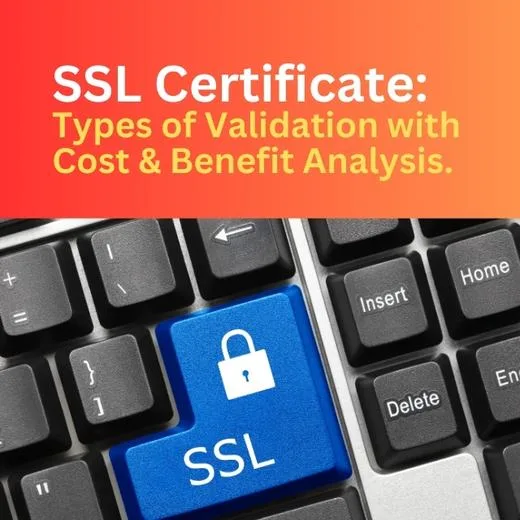Secure Sockets Layer (SSL) certificates are the bedrock of internet security, and their validation stands as proof of a website’s authenticity. With different types of SSL validations available, each serves a unique purpose tailored to varying levels of trust and vetting required by online entities.
This article delves into the types of SSL validations, shedding light on how they contribute to establishing a secure and trustworthy web environment.
Let’s dive in!
Understanding SSL Validation
SSL Validation is the process through which a Certificate Authority (CA) verifies the information provided by a website before issuing an SSL Certificate. This verification ensures that the website is legitimately operated by the entity it claims to represent and that the site’s ownership is valid.
The validation process is crucial because it helps to prevent fraud by providing visitors with evidence that they are, in fact, interacting with the website they intended to and not a malicious impersonation.
The level of validation required can vary, with some certificates necessitating a more rigorous investigation than others. For example, a basic Domain Validation (DV) SSL Certificate may only require the website owner to prove domain ownership by responding to an email or phone call.
In contrast, Extended Validation (EV) SSL Certificates demand a thorough vetting process, including checks into the physical existence of a company, its legal status, and its operational history.
The purpose of SSL Validation is to instill confidence among internet users. When a website has been validated, it means a trusted third party has confirmed the site’s identity, and the connection to it is encrypted and secure. This makes it more challenging for phishers and fraudsters to fake a trusted site and is meant to assure customers that it’s safe to provide sensitive information such as credit card numbers or personal details.
Domain Validation SSL Certificates (DV SSL)
DV SSL Certificates represent the most basic level of validation. To issue a DV SSL, the CA only requires verification that the applicant controls the domain. This process is usually automated and can involve the domain owner responding to an email or configuring a DNS record for the domain.
Since no company verification is required, DV SSLs can be issued within minutes of application, making them an efficient way to enable HTTPS for a site.
Ideal Choice for Startups, Freelancers, and Bloggers
While all other types of validation require the website owner to be a registered company, in reality, most websites are owned by individuals and hobbyists – who are here to learn and try to become an authority online.
In such a scenario, a DV SSL certificate is the most simple and affordable SSL one can get online without complex bureaucratic verification processes, which is more challenging than running a website combined for beginners with lesser legal knowledge.
DV SSL is a Low-Cost Solution
Pricing for DV SSLs can vary depending on the issuing authority and any additional features or services provided with the certificate. Some providers may offer DV SSL certificates for free as part of a hosting package (like in Cenmax’s Web hosting) or on a promotional basis.
In contrast, others charge an annual fee that can range anywhere from a few dollars to upwards of a hundred, based on the level of customer support and SSL warranty protection included.
Despite their low cost, DV SSLs activate the same browser security indicators—such as the padlock icon and HTTPS protocol—as more expensive SSL certificates, giving site visitors confidence that their connection is secure.
By opting for a DV SSL, businesses and webmasters can ensure an encrypted connection without incurring significant expenses. However, they should consider whether the nature of their online presence might warrant the additional investment in higher levels of validation for added trust, warranty, and verification.
Organization Validation SSL Certificates (OV SSL)
OV SSL Certificates take web security a step further by including an additional layer of validation. This middle-tier option requires that the business seeking the certificate undergo a more comprehensive vetting process than what is required for DV SSLs.
The Validation Process for OV SSL
When applying for an OV SSL Certificate, the Certificate Authority (CA) conducts a thorough check to confirm the business’s operational existence and legitimacy.
This includes verifying the legal, physical, and operational presence of the entity. The CA also confirms the identity and authority of the individuals involved in obtaining the certificate.
Why choose OV SSL over DV SSL?
For websites with an OV SSL Certificate, the enhanced verification process means that visitors can trust not just the security of their connection but also the legitimacy of the website owner.
If you are running an e-commerce business, establishing the trust between your company and user is more than crucial for increasing the conversion rates. This is where OV SSL Certificates come into play. An OV SSL Certificate comes with a dynamic site-seal that displays your company details and verification details, instilling more trust in users about your company – which means more conversions and lower cart abandonment.
While this may be significantly helpful for eCommerce websites, this adds little-to-no benefit for bloggers or individuals who don’t have to instill trust in the users’ mind, as they are here purely to educate the users.
Pricing Considerations
OV SSL Certificates are more expensive than DV SSLs due to the additional checks and labor involved in the validation process. Prices can vary widely based on the provider, with costs generally falling between DV and the more premium EV SSL Certificates. The investment in an OV SSL is often seen as worthwhile for businesses looking to establish greater trust without the higher price tag of EV certification.
Extended Validation SSL Certificates (EV SSL)
EV SSL Certificates are considered the gold standard in the world of SSL validation. They provide the highest level of assurance to website visitors by ensuring that the strictest validation standards have been met by the requesting entity. Historically, EV SSLs were distinguished in web browsers by displaying the company’s name directly in the address bar; however, this is no longer the case.
The Revised Indicators of Trust for EV SSL
In recent revisions to browser displays, the distinction of having a company name in the address bar for sites with EV SSL Certificates has been removed. Despite this change, EV SSLs still carry the prestige of a rigorous verification process, synonymous with a strong commitment to security and authenticity. The primary visual verification cues now align with those provided by OV SSL Certificates, such as the padlock icon and HTTPS protocol.
Warranty and Pricing of EV SSL
The main differentiators between OV and EV SSL Certificates in the current landscape are the warranty and price. EV SSLs come with a higher warranty, meaning the CA provides a more substantial guarantee against mis-issuance and other failures of the certificate. This higher warranty level reflects the comprehensive validation that backs each EV SSL, providing a financial assurance to the end-users conducting transactions on the site.
Pricing for EV SSL Certificates is on the higher end due to the intensive verification process required to issue them. Businesses purchasing EV SSLs are paying for the CA’s diligence in not only verifying control of the domain but also the operational and legal checks that confirm the business’s integrity and stability.
Deciding on an EV SSL Certificate
With the visual distinctions in browsers minimized businesses might weigh the benefits of an EV SSL against the cost. Although an EV SSL no longer results in the company name being displayed in the browser address bar, some companies continue to use EV SSL for their business website due to the higher warranty that comes with it.
Closing Words
Selecting the right SSL certificate is a critical decision for any website owner. Although the visual cues distinguishing DV, OV, and EV SSL Certificates have converged in web browsers, the levels of validation and assurance they provide remain distinct.
Let’s do a quick recap:
DV SSLs offer a basic level of encryption quickly and affordably, suitable for those just starting out or managing small websites with less risk of data theft.
OV SSLs present a middle ground, offering a degree of confidence in the business’s reliability and existence without the high cost associated with EV SSLs. They are ideal for businesses that handle customer transactions and wish to establish a good level of trust with their visitors.
EV SSLs, while no longer displaying the company name in the browser bar, continue to stand as the pinnacle of online trust and security, providing the highest warranties and signifying stringent validation processes. They are often favored by organizations where trust and security are non-negotiable, such as financial institutions or large eCommerce sites.
In the end, the decision between DV, OV, and EV SSL Certificates should be guided by your business’s size, the nature of the data you handle, and the level of trust you wish to establish with your visitors. No matter the type, implementing an SSL certificate is essential in protecting your site visitors and building a secure online presence.
At Cenmax, we offer comprehensive web hosting services that include free SSL certificates to ensure your website security is top-notch from the get-go. Visit our Web Hosting page for more information on how we can help secure your online business.

